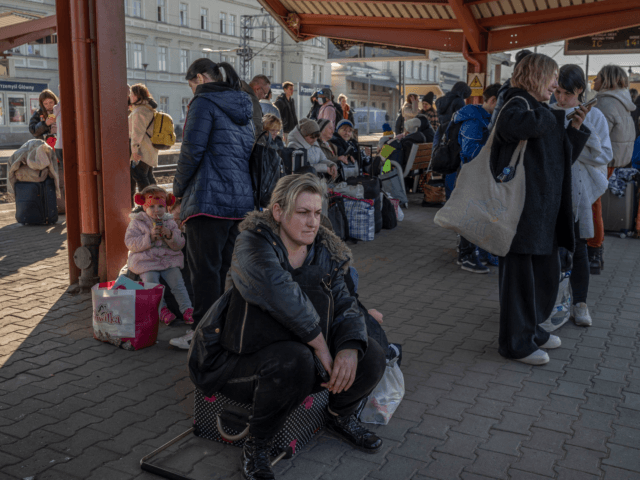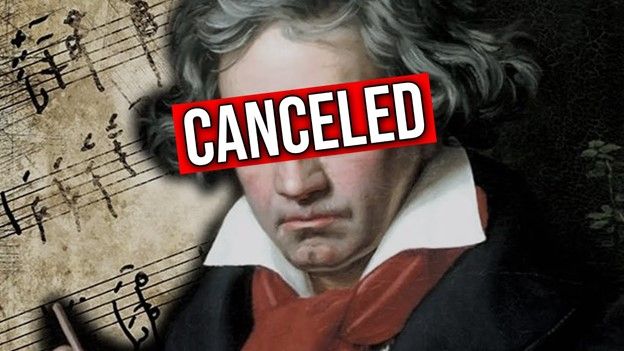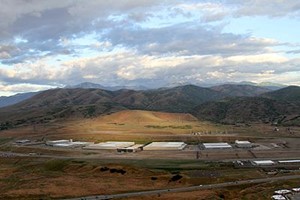UKRAINE-RUSSIA CONFLICT
NEWS AND COMMENTARIES
Opinions expressed in the enclosed articles and videos do not represent the views of Polonia Institute
1. LIVE UPDATES: Ukraine Says Russia Talks Moving Forward as West Plans More Sanctions
Talks between Ukraine and Russia are moving forward, President Volodymyr Zelensky said on Wednesday, as the West plans to announce more sanctions against the Kremlin amid a worsening humanitarian crisis.
But in an early morning address, Zelensky held out hope for negotiations, which have yielded little since the Feb. 24 invasion began.
“It’s very difficult, sometimes confrontational,” he said. “But step by step we are moving forward.”
2. Biden will discuss peacekeeping mission to Ukraine during his visit to Poland
U.S. President Joe Biden will arrive in Warsaw on Friday and is set to discuss the proposal to send a “peacekeeping mission” to Ukraine with Polish officials, a move that would represent a serious escalation in the war from the West if it were to occur.
Biden will discuss peacekeeping mission to Ukraine during his visit to Poland
3. Poland restricts half of its airspace for military use only
Half of Poland’s airspace is restricted for military use, according to the CEO of the Polish Air Navigation Services Agency Janusz Janiszewski
4. Airlift in Solidarity. Germany Demands America Take in More Ukrainian Refugees

Take more refugees — that’s the message Germany’s Foreign Minister, Annalena Baerbock, has for the Biden administration.
Joe Biden, the current president of the United States, has already reportedly opened the country up to a wide variety of migrants — Ukrainian refugees and otherwise, though it appears that Baerbock believes the country needs to take in even more people.
5. One Third of ‘Ukrainian Refugees’ Arriving in France Are Not Ukrainian
The intense wave of migration from Ukraine is said to be the Europe’s fastest in decades. But it has now been reported that as many as 30 percent of the Ukrainian arrivals are migrants of other nationalities, many of whom originate from Africa and the Middle East.
[…] Now it is reported that many of the new arrivals being identified by French authorities are not Ukrainian. Allegedly, “7.5 percent are of Algerian nationality, while 3.5 percent of arrivals are from the Ivory Coast and Morocco respectively … Indians and Kyrgyzstan nationals are next on the list at 2.5 percent apiece, while other nationalities arriving include the Democratic Republic of Congo, Cameroon, Pakistan, Nigeria, and China” according to Remix News and Le Figaro.
6. Ukrainian refugees in Sweden fearful after migrant males attempted to break into their hostel
Ukrainian refugees in Sweden fearful after migrant males attempted to break into their hostel
7. Former top Pentagon advisor Col. Doug Macgregor on Russia-Ukraine war
8. Ukraine and the Clash of Civilizations
Consider just a few examples of how American leaders fumbled certain specific challenges at the end of the Cold War. […] In maybe the worst blunder of the post–Cold War period, the United States assumed that once Iraqis had been saved from a dictatorial regime they would rally to the flag of democracy, disregard centuries of ethnic and religious tensions and quickly embrace Western rights, values and outlooks.
What all these blunders have in common is the neglect of Samuel Huntington’s insight that the post–Cold War world was arranging itself along ethnic, religious and civilizational lines. Nations were throwing off artificial Cold War alliances and rallying around common historical ties. We should have been able to predict that Turkey would gravitate into the Islamic world and away from NATO’s interests, or that Orthodox Greece would be one of the most troublesome members of the European Union, or that Muslim Chechnya would seek independence from Orthodox Russia. As Huntington wrote, “In the post–Cold War world, the most important distinctions among peoples are not ideological, political, or economic. They are cultural.”
U.S. policy toward Russia has suffered deeply from failure to understand what most motivates the action of groups. […]
Since Huntington’s insights and predictions were far more prescient than Fukuyama’s and those of many others, the U.S. foreign policy establishment should have heeded his advice when the crisis in Ukraine emerged. But, it did not.
Huntington predicted the crisis in Ukraine. His theory that nations would return to their historical and cultural roots had a natural corollary: nations that were divided between civilizations, so-called “cleft” countries, were the places that would most likely generate great-power conflict. […]
By Huntington’s civilizational standard, Ukraine is a severely cleft country,…..
https://nationalinterest.org/feature/ukraine-and-clash-civilizations-153636
9. How Not to Think About Ukraine
As Russia wages war on its neighbor, Western observers fall into familiar patterns of thought, with potentially disastrous results.
[…] Just when sobriety, responsibility, probity, and diplomatic skill are most needful, our pundits and policymakers offer the opposite: trembling emotion, cheap propaganda, wild fantasies, a refusal to dialogue and de-escalate. And the worst part is: It’s all so damned familiar. Once more, we are falling—or rather, being driven—into structural information traps that hamper sound decision-making and force policy choices we might regret dearly when it’s too late.
[…] notice—and beware—three info-trap patterns common to all of these media moments.
First, beware emotionally charged images that tend to overwhelm reason. […]
Second, beware the treatment of dissent or criticism as treason. […]
Third and finally, beware delusions of total mastery over complex crises. […]
SOCIETY/CULTURE
10. The Assault on Classical Music

[…]
You will find far-Left black activist and novelist, Candace Allen—a graduate of whitey’s Harvard—pegging the problem of whitey’s classical music’s whiteness in “Class, race and classical music” at The Guardian. You will find the U.S. (mostly white) taxpayers’-supported National Public Radio (NPR) asking, “Why Is American Classical Music So White?”
One, Nebal Maysaud, “a queer Lebanese composer based in the Washington D.C.” asserted in 2019: “It’s Time to Let Classical Music Die.” Maysaud declared his victimhood as a “musician of colour” who along with his POC (“people of colour”) mates is “exoticised” and “tokenised” and thrown a few scraps by whiteys.
“Western classical music is not about culture. It’s about whiteness,” diagnosed postcolonial Nebal before proceeding to such unintentionally comedic statements as “European traditions which serve the specious belief that whiteness has a culture,” and “Western classical music depends on people of colour to uphold its facade as a modern, progressive institution.”
[…]
Seen in this context, the whining of poisoned white minds about the “whiteness in classical music” is a stream of demented ordure, and the “canceling” of classical composers of yore because of their racism is a hypocritical exercise of a double bias of presentism and relativism, i.e. judging white people who lived a hundred, two, or three hundred years ago by the standards of today, and not judging “people of colour” (POCs) who lived then—or even those who live now—by the same standard. As to the POCs’ criticism of the whiteness of classical music, that’s an understandable bias that white people of sound mind ought to ignore, or else complain in return about the blackness of basketball, short-distance running, rap, hip-hop, and male jewellery.
https://forumfordemocracy.com/article/the-assault-on-classical-music
11. Resets in Utah
The “stake” in stakeholder capitalism goes through the heart of individual liberties.

We hear much these days about paradigm shifts and resets. Much of the chat comes from crucibles like the World Economic Forum. The WEF is a kind of “masters of the universe” boys club that meets to greet, eat, and ski at fabulously expensive hotels and restaurants in Davos, Switzerland. The globalist press covers these champagne and caviar festivals because the Fourth Estate loves to hobnob with power and money. The holy grail these days seems to be the pursuit of a “great reset,” or stakeholder capitalism; in practice a Beijing model, more like capital Communism. A Chicom theologian would argue that their “capitalism” is just a phase on the way to totalitarian social stability. For monopolist mandarins in America and Europe, the Covid-19 crisis is indeed a golden opportunity to remake the world, “capitalism with a Chinese face” if you will.
[…]
Big reset there too.
Below the radar since 9/11, a digital hardware paradigm shift is underway also, out in the desert sands. Bluffdale, Utah is now ground zero for a mega-shift in the metadata trade.
[…]
The siting of mega collection and storage in Bluffdale is no happenstance either. That desert oasis has three distinctions; isolation, sister wives, and a state prison. NSA, a DOD agency, has a sweetheart deal with Utah State Police where local cops are paid $50 per hour for perimeter security. In exchange, NSA is unlikely to see any citizen dissent or unsightly protests anywhere near Bluffdale’s harems or the NSA data facility.
https://www.newenglishreview.org/resets-in-utah/
12. We Will Delete You
How liberal democracies acquired the power to end your participation in society with the push of a button
Before beating a hasty retreat, Canadian Prime Minister Justin Trudeau went where no world leader has gone before. Last month, he became the first Western leader to wield the financial system as a push-button weapon of government enforcement against opinions and behaviors that he found politically distasteful or inconvenient. This is an entirely new form of power, which much of the world has not even begun to reckon with—but which may well define our politics in the years to come.
https://www.tabletmag.com/sections/news/articles/we-will-delete-you